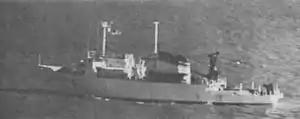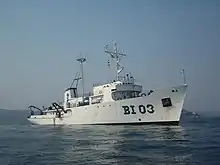 USNS James M. Gilliss (AGOR-4) on 14 December 1962 | |
| History | |
|---|---|
| Name | James M. Gilliss |
| Namesake | James Melville Gilliss, born 6 September 1811 in the District of Columbia |
| Builder | Christy Corporation, Sturgeon Bay, Wisconsin |
| Laid down | 31 May 1961 |
| Launched | 19 May 1962 |
| Sponsored by | Mrs. Hubert H. Humphrey, wife of the Senator from Minnesota |
| Acquired | by the U.S. Navy, 5 October 1962 |
| In service | 5 November 1962 as USNS James M. Gilliss (T-AGOR-4) |
| Out of service | 1980 |
| Identification | IMO number: 7338339 |
| History | |
| Name | ARM Altair |
| In service | 15 June 1983. Loaned to Mexico 15 June 1983, sold to Mexico 4 December 1996 under the Security Assistance Act. |
| Status | Shown as operational 2019 |
| Notes | Based Manzanillo, Colima |
| General characteristics | |
| Type | Robert D. Conrad class oceanographic research ship |
| Displacement |
|
| Length | 209' |
| Beam | 40' |
| Draft | 16' |
| Propulsion | diesel-electric, single propeller, 2,500shp, retractable azimuth-compensating bow thruster |
| Speed | 12 knots |
| Complement | 23 civilian mariners, 38 scientists |
| Armament | None |
USNS James M. Gilliss (T-AGOR-4) was a Robert D. Conrad-class oceanographic research ship acquired by the U.S. Navy in 1962. The ship was operated by the Military Sea Transportation Service (MSTS now MSC) and managed by the Naval Oceanographic Office as one of the "Navy Pool" vessels serving various Navy laboratories and projects in the Atlantic Ocean. After active Navy pool service the ship was assigned to the University of Miami to operate as part of the University-National Oceanographic Laboratory System (UNOLS) fleet until 1979.
James M. Gilliss was loaned to the Mexican Navy in June 1983 as an oceanographic research ship to become ARM “Altair” (BI-03). Mexico bought the ship December 1996 under the Security Assistance Act.
Built in Sturgeon Bay, Wisconsin
The second ship to be so named by the Navy, James M. Gilliss (T-AGOR-4) was laid down by Christy Corporation, Sturgeon Bay, Wisconsin, 31 May 1961; launched 19 May 1962; sponsored by Mrs. Hubert H. Humphrey, wife of the Senator from Minnesota; delivered to the Navy 5 October 1962; and turned over to the Military Sea Transportation Service (MSTS) 5 November 1962, Captain Torston Johnson in command.[1]
Naval Oceanographic Office service
The ship was by operated by the Military Sea Transportation Service (MSTS) and managed by the Oceanographic Office as one of the "Navy Pool" vessels for which the office coordinated use by Navy laboratories, universities and research organizations with Navy contracts for varied projects.[2][note 1]
In addition to the latest in oceanographic and meteorological equipment, she also possessed unusual design features, including special antiroll tanks for stability and a retractable bow propulsion propeller. As a mobile, floating research laboratory, she was capable of carrying out experiments in sound transmission, underwater life, and ocean floor characteristics, thus enabling her to help continue the Navy's lead in the exploration and understanding of "inner space."[1]
Searching for Thresher
Departing Sturgeon Bay 8 November, she arrived New York City 19 November for sea trials and shakedown. On 12 April 1963 she departed New York City to take part in the massive search for sunken submarine Thresher (SSN-593). Operating out of Boston, Massachusetts, she lent her "know-how" to this vital and difficult operation for 5 months before arriving Washington, D.C., 22 September. After returning to New London, Connecticut, for additional equipment tests, she departed 1 November for oceanographic research operations off Bermuda.[1]
North Atlantic operations
During the next 4 months she operated in the Atlantic from the Bahamas to the New England coast. In March 1964 she steamed to the Caribbean for surveying and scientific work out of San Juan, Puerto Rico. Arriving Key West, Florida, 28 March, she operated from the Strait of Florida to the Bahamas and Bermuda for more than a year.[1]
Departing Key West 23 May 1965, she arrived New York 27 May and prepared for deployment to waters off the British Isles. She sailed 14 June; arrived Belfast, Northern Ireland, 27 June; and began 3 months of research and survey operations from the British Isles and France to Newfoundland.[1]
Departing Belfast 15 September, she returned to New London 6 October and resumed research operations off the U.S. East Coast, which have continued into 1967. She continued to operate in the Atlantic from New England to the Bahamas while supporting important surveys and scientific experiments of the Naval Oceanographic Office.[1]
University of Miami
The ship was reassigned to the University of Miami to replace the R/V Pillsbury, which was to be retired in summer of 1971, and operate as R/V James M. Gilliss, one of the Navy owned vessels of the University-National Oceanographic Laboratory System (UNOLS) fleet.[3][4] As an example of work during this phase the ship, along with University of Miami's R/V Columbus Iselin was among other government and institutional ships taking part in the Global Atmospheric Research Program Atlantic Tropical Experiment in 1974.[5] The ship went out of UNOLS service in 1979.[3] Two new ships, ordered by the National Science Foundation and due for completion in June and September 1981 were to replace Duke University's R/V Eastward and University of Miami's R/V James M. Gilliss respectively.[6]
Navy inactivation
James M. Gilliss was placed out of service on an unspecified date. Between 18 March 1980 and 14 June 1983 the ship was in the custody of the United States Maritime Administration in the Beaumont, Texas reserve fleet.[7]
Mexican service

On 15 June 1983 the ship was loaned to Mexico to become the Buques de Investigación Oceanográfica ARM Altair (BI-03) surveying for the Mexican navy.[8][9] Altair, along with ARM Antares (BI-04) (ex S. P. Lee (T-AGS-31)), are listed as operational in 2019 and based in Manzanillo, Colima.[10] The ship was transferred to the Mexican Navy on 4 December 1996 under the Security Assistance Act.[8][11]
Footnotes
- ↑ The referenced report lists the organizations using the Navy Pool T-AGORs during the covered period and the pool ships: James M. Gilliss, Charles H. Davis, Sands, Lynch, De Steiguer, and Bartlett.
References
- 1 2 3 4 5 6 Naval History And Heritage Command (7 February 2006). "James M. Gilliss II (T-AGOR-4)". Dictionary of American Naval Fighting Ships. Naval History And Heritage Command. Retrieved 6 September 2019.
- ↑ Tidrick, D.E.; Morris, R.E. (April 1970). A Bibliography of Reports, Articles and Data References Resulting From Scientific Operations Aboard the Navy Pool (T-AGOR) Ships: 1963 Through 1969 (PDF). Naval Oceanographic Office Informal Report Number 70-25 (Report). Washington, D.C.: Naval Oceanographic Office. pp. 1–2. Archived from the original (PDF) on November 16, 2019. Retrieved 13 September 2019.
- 1 2 "Historical List of all UNOLS Vessels". University-National Oceanographic Laboratory System. Retrieved 13 September 2019.
- ↑ Nelson, Stewart B. (1971). Oceanographic Ships, Fore and Aft. Washington, D.C.: Office of the Oceanographer of the Navy; Government Printing Office. p. 221. LCCN 71614043. Retrieved 13 September 2019.
- ↑ "Global Atmospheric Research Program Atlantic Tropical Experiment (GATE)". GATE (News, press release). May 9, 1973. Retrieved 13 September 2019.
- ↑ "University Of Miami: Atlantic Marine To Build Two NSF Research Ships At Cost Of $5.9 Million". Maritime Reporter. No. July 15, 1980. Retrieved 13 September 2019.
- ↑ Maritime Administration. "James M. Gilliss". Ship History Database Vessel Status Card. U.S. Department of Transportation, Maritime Administration. Retrieved 13 September 2019.
- 1 2 "World Navies Today: US Navy Vessels Decommissioned Since 1980". 10 March 2003. Retrieved 13 September 2019.
- ↑ "ESPECIFICACIONES DEL BUQUE DE INVESTIGACIÓN OCEANOGRÁFICA ARM "ALTAIR" (BI-03)" (PDF). Secretaria de Marina – Dirección General Adjunta de Oceanografía, Hidrografía y Meteorología. Retrieved 5 September 2019.
- ↑ "Buques de Investigación Oceanográfica". Dirección General Adjunta de Oceanografía, Hidrografía y Meteorología. Retrieved 6 September 2019.
- ↑ "Non Active Vessels". U.S. Navy, Naval Vessel Register (NVR). Retrieved 13 September 2019.
- This article incorporates text from the public domain Dictionary of American Naval Fighting Ships.
External links